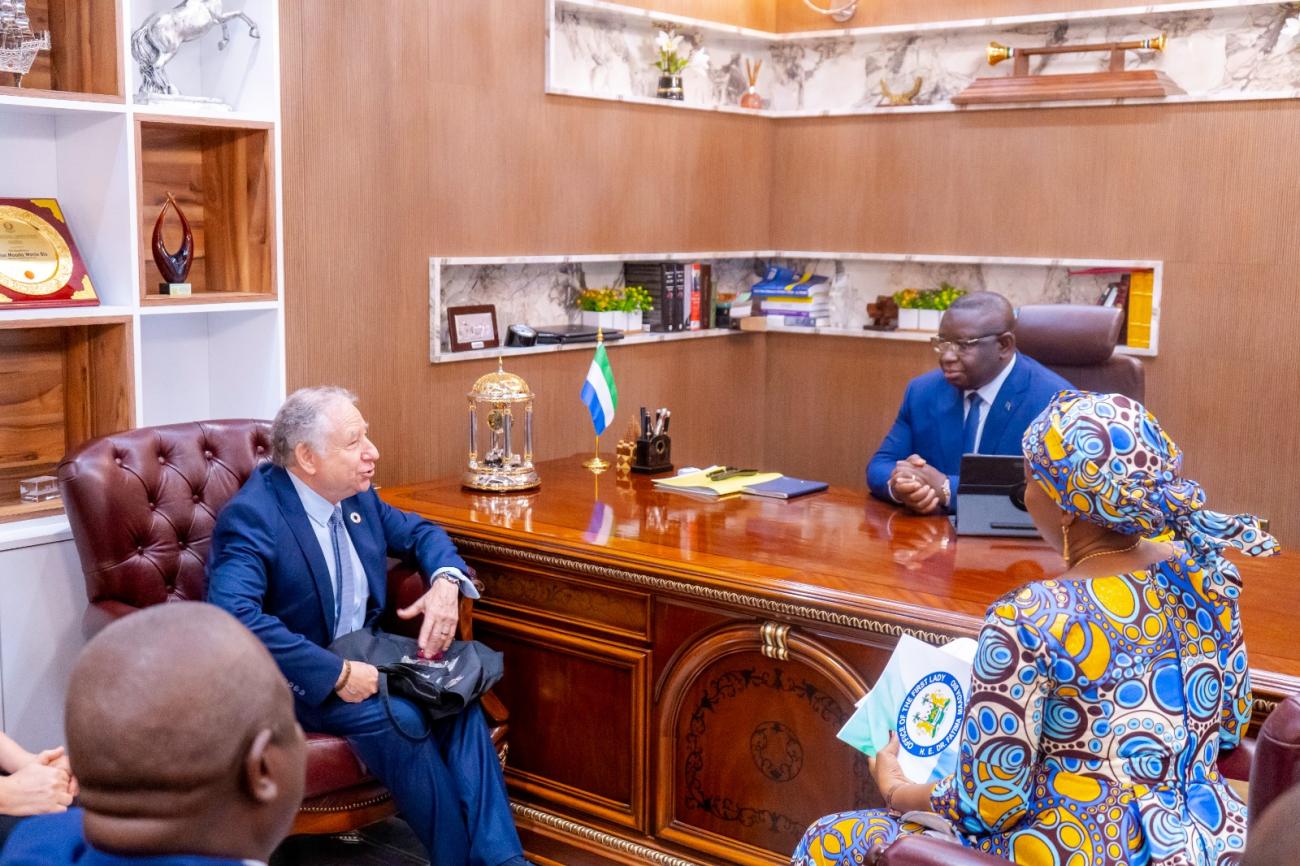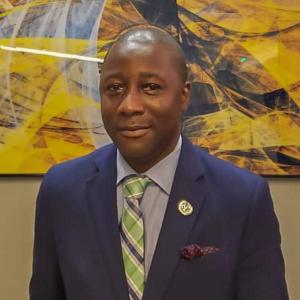The UN Secretary General's Special Envoy for Road Safety, Jean Todt, has concluded a two-day visit to Sierra Leone. During this visit, he called on African countries to take stronger action to address the "silent pandemic" of lives lost in road crashes.
The Special Envoy underscored that the African continent suffers the greatest loss of lives, the highest burden on the health system, and the most significant loss of GDP due to road traffic injuries. According to a new WHO report, Africa was the only continent to record an increase in the figures for victims on African roads, with a mortality rate of 19 per 100,000 people, while in Europe, the rate is 7 deaths per 100,000. In Sierra Leone, there are 14 deaths per 100,000 (WHO 2021).
In his engagement with President Julius Maada Bio and First Lady Fatima Bio at State House on his first full day of the visit, he entreated the President to work with his Rwandan counterpart, President Kagame, for road safety to be given the highest consideration at the African Union in their pursuit of the "Africa We Want." The African Union Agenda 2063, spanning 2024 to 2033, is a bold and ambitious blueprint to build on progress towards and the quick implementation of "The Africa We Want". It will also contribute to achieving the goal of the second Decade of Action for Road Safety to half the number of road traffic deaths by 2030. Today, around 1.2 million people die, and 50 million are injured each year as a result of road crashes.
"We need strong leaders committed to speaking about road safety to save lives, and your support, together with President Kagame and other African Union Member States, would be a game changer", said the Special Envoy, Mr Jean Todt.
On Sierra Leone, he said his visit was to discuss with the authorities how partnerships with the private sector, the United Nations, development partners, influencers, and other stakeholders would ensure the attainment of SDG 3.6 and SDG 11.2. That is, to halve the number of global deaths and injuries from road traffic crashes and improve access to safe, affordable, accessible, and sustainable transport for all.
Mr. Todt pointed out that the good news is that we know the prescription for success, but it requires the whole society to work together to tackle the issue.
In Sierra Leone, Mr Todt said he has seen many two-wheelers (Okada riders) riding their motorbikes with helmets but too many others without, and even many of those with them are using helmets that are not safe or not being used safely. "They need to be UN-compliant, ventilated helmets, which can cost less than USD 20$. Ensuring their availability requires private sector involvement to produce and provide these helmets responding to UN safety standards for riders."
The President responded that road safety is a major concern and requires concerted effort from every Sierra Leone. He promised to engage with other African Union Member States to push for road safety on the AU Agenda and for ECOWAS to give the issue due consideration. "The UN can join the efforts of the Government to address the issue," President Bio said while promising the Envoy that he has his full support.
At a stakeholder event Mr. Todt and the First Lady held at the State House afterwards, the Special Envoy said he hoped Sierra Leone would be a leader in Africa to address the silent pandemic and that the country is an ideal partner.
The head of the Sierra Leone Roads Safety Authority (SLRSA), Smart K. Senessie, said the country is in a hurry to tackle the road safety emergency. "We need to do more to address issues of road safety."
In an earlier engagement with the United Nations Country Team, he said road crashes are the number one killer for youth aged 5-29 years in Africa and that to address the issue requires education, speed law enforcement, safe quality vehicles, good quality roads, and rules against drunk driving and use of telephones while at the wheel.
Mr. Todt encouraged the Country Team to explore avenues with the United Nations Road Safety Fund, which is about to launch a call for road safety project proposals, and with the UN Global Compact to see how it can cooperate with the Government to make our roads safer.
On Wednesday, his last day, he visited the SLRSA project site on the outskirts of Freetown, where he was welcomed with a quarter guard parade consisting of eighteen personnel, including three females, under the command of Route Commander Saidu Kamara.
The stakeholders called for UN leadership and support, which is crucial to ensure that no journey ends in tragedy.
The Special Envoy responded that he would be committed to addressing road safety and that WHO Sierra Leone would follow up .
He ended his visit with a tour of the Surgical Centre in Goderich, operated by EMERGENCY NGO. The hospital, the only one that treats patients for free in the entire country, received 900 admissions in 2023, with 270 of them from road crashes, according to Dr Giuseppe Meucci (Interim Medical Coordinator).
The climax of his 2-day mission was a press conference with the First Lady, who is also part of the high-level network of the Friends of the Special Envoy, including senior representatives from Government, international institutions and civil society, including former Ivorian International footballer Didier Drogba who is also engaged in a new UN global advocacy campaign for road safety #MakeASafetyStatement .
The First Lady said it was good that the Envoy visited to "see our vulnerable side and for him to understand the country's needs in terms of road safety"."
Mr. Todt said he was leaving the country full of hope because he saw commitment and engagement, but its success depends on a collective effort.
According to SLRSA figures, in the first quarter of the year, 29 road crashes led to death, 146 severe injuries and 94 minor injuries. WHO reports on a road fatalities rate of 14 per 100,000 population (WHO 2021).
There are an estimated 1.6 million bike riders among the country's approximately 8 million population, and they are the main victims of traffic crashes in Sierra Leone.
The next major meeting for road safety on the global level will be in Africa during the 4th Global Ministerial Conference for Road Safety in Marrakesh, to be held on 18-19 February 2025.



